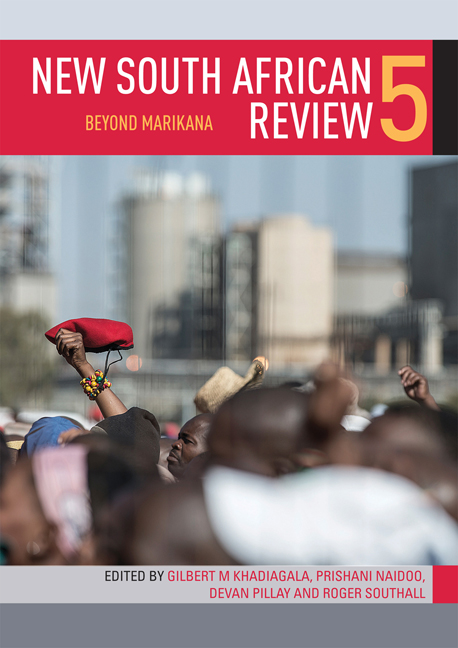Book contents
- Frontmatter
- Contents
- Preface
- Introduction: Political reconfigurations in the wake of Marikana
- PART 1 NEW POLITICAL DIRECTIONS?
- PART 2 ECONOMY, ECOLOGY AND LABOUR
- Introduction to Part 2
- Chapter 4 The South African economy: The minerals-energy-finance complex redubbed?
- Chapter 5 Between a rock and a hard place: State-business relations in the mining sector
- Chapter 6 The platinum belt strike wave: Breakdown in the institutionalisation of industrial conflict
- Chapter 7 When gold mining ends: An environmental catastrophe for Johannesburg?
- PART 3 STATE AND SOCIETY
- PART 4 SOUTH AFRICA IN THE INTERNATIONAL ARENA
- Contributors
- Index
Introduction to Part 2
from PART 2 - ECONOMY, ECOLOGY AND LABOUR
Published online by Cambridge University Press: 21 April 2018
- Frontmatter
- Contents
- Preface
- Introduction: Political reconfigurations in the wake of Marikana
- PART 1 NEW POLITICAL DIRECTIONS?
- PART 2 ECONOMY, ECOLOGY AND LABOUR
- Introduction to Part 2
- Chapter 4 The South African economy: The minerals-energy-finance complex redubbed?
- Chapter 5 Between a rock and a hard place: State-business relations in the mining sector
- Chapter 6 The platinum belt strike wave: Breakdown in the institutionalisation of industrial conflict
- Chapter 7 When gold mining ends: An environmental catastrophe for Johannesburg?
- PART 3 STATE AND SOCIETY
- PART 4 SOUTH AFRICA IN THE INTERNATIONAL ARENA
- Contributors
- Index
Summary
In his recent book Seventeen Contradictions of Capitalism, David Harvey makes an important distinction between ‘dangerous’ contradictions and ‘fatal’ contradictions. In doing so, he draws on the dialectical-materialist methodology of Karl Marx, and argues that, in his mature work, Marx did not see the inevitability of capitalism's downfall, owing to its internal contradictions (as many Marxists believed during the past century). Instead, Marx saw that the system will always find a way to turn limits – whether socioeconomic or natural (that is, environmental) – into barriers that can be overcome.
However, for Harvey there are two contradictions that, if not yet ‘fatal’, are ‘dangerous’: namely, the intertwined contradictions of the compound rate of growth and of nature. Capitalism has one inherent logic, incessant growth (or accumulation for the sake of accumulation). If left to its own devices, it will grow exponentially, at a compound rate. This means that capital has to scour the world to find investment opportunities, leaving no stone unturned, no tree uncut, no waters unfished, and no land unmined. Its intrinsic DNA is to act like a virus, infecting everything in its wake.
Capital, in other words, may not have intrinsic natural limits, according to Harvey, as it always finds a way out of its constraints. When challenged by climate change and other problems of environmental degradation, it has entered the green economy with marketbased ‘solutions’ – carbon trading, organic farming, renewable energy or green buildings – designed not to resolve the fundamental causes of environmental collapse, but to seek new opportunities for accumulation. It has successfully transformed the notion of ‘sustainable development’, which initially sought to subordinate economic growth to environmental sustainability (thus preserving the earth for future generations), to ‘sustaindevelopment’, which seeks to subordinate the environment to economic growth through environmental ‘fixes’ designed to temporarily overcome barriers to profitablity such as declining fossil fuels, water and other resources, or threats of carbon taxes.
When challenged by labour in the 1970s, and the declining rate of manufacturing profit, capital turned to various fixes such as the spatial fix (moving to cheap labour countries), the technology fix (through labour-shedding innovations), or the financial fixes (where massive profits can be made from fictitious commodities). Indeed, the financialisation of capitalism is a key aspect of what is called ‘neoliberalism’, the post-1970s or post-Keynesian/developmentalist era of market liberalisation.
- Type
- Chapter
- Information
- New South African Review 5Beyond Marikana, pp. 64 - 66Publisher: Wits University PressPrint publication year: 2015



